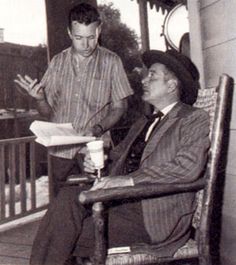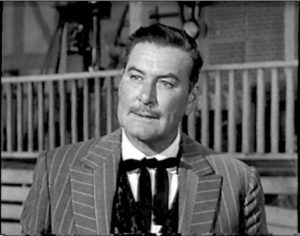Ahoy all, and welcome to this New Year!
A few years ago, I purchased an audio collection entitled Too Hot For Radio, and on it was a brief selection that was a so-called “commercial spot” featuring Anthony Quinn and, of all people- Errol Flynn. No other information on it was given. It was an odd sort of offering, and not so clearly audible, nor understandable as to just what it was … and it intrigued me!
I began, sometime later, cataloguing the various extant Flynn audio, remembered this one, and started looking into its possible background. And through listening to it a number of times, it finally “spoke to me” as to a possible context, and lead me to checking out the written record (various books) for further insight.
One day, Linc and I were aboard Zaca, at the same time, and I had recently sent him the recording of the Blood Drive Commercial … the following dialogue ensued, in real time, which I then edited and preserved in this separate form- round or about 6/26/06. It was very exciting to me at the time having “collaborated”, if only momentarily, with the GREAT Flynn scholar!
Karl
“Blood Drive Commercial description: This particular recording, I believe, is the ONLY known TRUE recording of an instance of a Flynn practical joke that has survived. It has been preserved in the collection “Too Hot For Radio”. It is, ostensibly, a LIVE radio commercial break during an equally LIVE radio program broadcast. Anthony Quinn and Flynn are doing this spot for a blood drive. Quinn is making the pitch, in earnest, explaining the process of giving blood and highlighting how they give you a glass of milk at the end. Flynn playfully interjects: “Do they give you any brandy in it?” Quinn fumbles a bit in his words, and Flynn adds how they call the drink a “Velvet Cow” in Australia. Quinn tries to recover and pick up where he left off and continues till he reaches his final point: ” … with men giving their lives, the least everyone can do is give a drop of blood.” Errol, rather thick tongued in his speech, now takes over commenting on the quality of the preceding entertainment (the radio program) by saying: “As a matter of fact, you know all of this program, you know damn well it’s alot of crap.” And then just as suddenly retreats (in silence) leaving “Tony” to pick it up from there. Quinn doesn’t seem to know what to say next. Finally, a third person enters the conversation and is chewing them both out, about expletives being said on the Columbia Network, WITH HIS OWN EXPLETIVES. And that’s where the recording ends abruptly. Once thought about, there can be but one conclusion- the mike wasn’t live, and so this was, in fact, a practical joke played on Quinn, by the third man and Quinn’s partner. What we couldn’t hear, but was no doubt later said … “Gotcha Tony!” 2
Blood Drive Gotcha.mp3
(The following exchange is between Lincoln Hurst and Karl Holmberg about this unusual recording)
Karl: Now, Anthony Quinn, in his (1995) WONDERFUL autobiography One Man Tango (a sobriquet given him by no less than Orson Welles) tells a story of a prank pulled on him, which Flynn orchestrated, that involved a whole cast of characters including Quinn's father-in-law, Cecil B. DeMille. Quinn says it took place in St. Louis and it was during a war bond selling appearance on radio with Gene Tierney and Flynn. Flynn had kept him up most of the night, yet roused him early the next morning saying the broadcast time had been changed … I will say no more, but the description of it all is right up there with the Barrymore Body snatching story (which never happened) discussed here in the past. One Man Tango is worth a read along with Quinn's other (autobiography) Original Sin (1972).
Linc: Hmmm – I somehow got the feeling, while I listening to it, that Anthony may have embroidered the same story in his autobiography – just a little bit. To make the story complete, here's the full text of Quinn's account, as it appears in his autobiography 3:
“I WAS IN ST. LOUIS, selling war bonds over the radio with Errol Flynn and Gene Tierney, when my father-in-law* consented to work his clout in an elaborate charade at my expense.
I will backpedal, and explain. Errol Flynn was a delightful man, and an outstanding friend. I met him first through John Barrymore, whom he greatly admired, but he stood much taller on his own. When he was around Barrymore, Flynn was like a little boy. He wanted so badly to be like Jack that he was almost cartoonish in his emulation. (He even went on to play Barrymore in a 1958 Warner Bros. picture called Too Much Too Soon, based on the memoirs of Jack's daughter Diana.)
Still, I loved Flynn and cherished our friendship. He was a sweet, troubled man, and a wonderful athlete. (There was such grace to his movement!). He was also a famous practical joker. We made several pictures together, and when we found ourselves on shared patriotic duty in St. Louis, he took the opportunity to dupe me in high style. The night before our scheduled appearance, Flynn kept me out late, drinking. In those days, it did not take much to keep me out late, drinking, especially when I was on the road for one of these promotional appearances. I hated these godawful publicity tours! There was nothing more distasteful than having to sell myself to the public every time a picture came out, and these war bond pitches struck me merely as more of the same. A night on the town with an old friend like Errol Flynn made it bearable.
We were due to appear live on national radio at about eleven o'clock the following morning, and Flynn roused me from my bed in my hotel room at seven. I had just fallen asleep, and now he wanted me to go to work. He said the time of the broadcast had been changed, and we were needed down at the studio earlier than planned.
“Christ, Errol,” I said, trying to rediscover the powers of speech, “we were out till-four in the morning. I must look like shit. ”
“Up, up, up,” he said, bouncing about the room like it was nothing at all. (Even at seven o'clock in the morning, after a drunken evening, he moved like a dancer.) “It's just radio. No one will see you.”
He called Gene Tierney, who was also a bit hung over from the night before, and told her of the change in schedule. The three of us gulped down some coffee and raced for the studio. When we got there, Flynn began to panic. He had been reasonably composed on the ride over, but now he unreasonably fell apart. There was no script, he railed. There was no coffee. There was no one from the war office to tell us what to do. It did not seem such a big deal-we had done the same thing a dozen times-but Flynn made such a flowery show of frustration that he soon had us all frantic. We hurriedly went over who would say what, and when, and developed a rough format to see us through the allotted time.
I went on first. I had a splitting headache, and wanted to be anywhere else but in that studio, but I tried to tough it out. It was for a good cause, and I had given my word. I introduced myself, made a little speech about my friends Gene and Errol, spoke about the importance of the American effort overseas, and turned the microphone over to Gene. She made her appeal, told a few jokes, and sent it back to me. Then I made another pitch, said a few kind words about Errol, and called on him to join me.
All of this took about five minutes, and we still had the balance of a half-hour to fill. We were counting on Errol to carry the day, but he stepped to the microphone and announced to all of America that he was so hung over he could not believe he had gotten out of bed at such a ridiculous hour. His speech was loud, and slurred, and colorful. “And this fucking Indian,” he said, looking at me, “my friend … He's the son-in-law of that sonofabitch, C. B. De Mille. Christ, I wish I could remember his name. He played with me in that Custer picture, maybe you've seen it. Ah, but what the hell, right? They're all the same.”
I was furious. I did not know whether to beat the crap out of Errol or pull him from the microphone to save all of us from any further embarrassment. In my indecision, I did nothing.
“And the lovely Miss Gene Tierney,” he rambled on. “What a gorgeous thing. I want to just state for the record that I am not having an affair with her, that I have never had an affair with her, and that I have no immediate plans to have an affair with her. She's a real fucking sweetheart, but that's all. Of course, if she would like to try to change my plans, I would be open to suggestions. ” He sounded more intoxicated than he had the night before, and it was a wonder Gene did not sock him right in the mouth, but he kept on, each sentence more inappropriate than the last. He must have gone on in this way for four or five minutes, but it seemed as if he filled the entire half-hour. Finally,
the studio director shot out of his booth, screaming and waving his arms. He cut the mike and lit into Flynn: This is live radio! You're supposed to be selling war bonds! What the hell are you doing? Then he admonished me for my complicity, and told Gene that by not responding to Flynn's lecherous remarks she had come across as a fool.
Errol grabbed the poor bastard by the collar and started wrestling with him on the ground. It was an ugly, offensive scene, and I watched it play out as if in slow motion, all the time thinking of the damage it would do to my already tentative career.
By the time I got back to my hotel room, there were messages from Hedda Hopper and Louella Parsons. Louella and I were friends (we played poker
once a week with Howard Hawks and assorted others), so I returned her call first. She told me that the broadcast was already the talk of the town, and wondered with me at the fallout. “Jesus, Tony,” she sympathized. “It's a terrible thing, for you to be caught up in something like this.”
As soon as I hung up, the phone rang again. It was De Mille. In all the time I had been married to Katherine, he had never picked up the telephone and called me himself. We spoke only at family occasions, and at the studio. For him to call-now, over such as this-was something indeed. “Tony,” he said, “about this mess our Mr. Flynn seems to have gotten us into. . . ”
“Mr. De Mille,” I said, cutting him off. “Let's not blame Errol. We were all out a bit late last night, and I'm afraid some of us had a bit too much to drink. He didn't know what he was saying. ” I do not know why, but 1 went out of my way to cover for Flynn.
De Mille blustered on about how my unprofessional behavior reflected badly on him, and on Katherine. He said he expected more of me, and worried that I would never be serious enough to sustain my career. I hung up the phone thinking I had let the great man down, even though I could not think of a thing I had done wrong.
Next it was Katherine on the line, and then my agent, and each call reinforced the urgency of the moment. God, this thing was turning out to be far more than I had counted on. I lay back down on the bed thinking my career was lost, the phone to my ear telling me I had stepped feet first into the latest Hollywood scandal.
And then came the punch line. The last call I took was from Errol Flynn, sounding sober as the day he was born. His was the last voice I wanted to hear. “Gotcha, Tony! ” he said, and then he laughed like a madman. When he calmed down enough to explain himself, my mischievous friend told me he had orchestrated the whole fine mess. He had slipped the studio hands a few bucks to let us in early to a dormant sound room, and asked the director to play along. Then he arranged for De Mille and the gossips to check in with their distress calls. No one outside the studio had heard Errol's rude commentary. The fight, the name calling, the loose talk … everything was staged.
(We went back to the radio station, at eleven, for the real broadcast.) I did not know what to think. I was relieved, of course, but beyond that I was not sure. In the end, what I was left to think was that if icons like Errol Flynn, Gene Tierney, Louella Parsons. and C. B. De Mille would go out of their way to lure me into a practical joke, then maybe things were not as bad as they seemed. Maybe there was a place for me in this business after all.”
Karl: A simple situation MUCH elaborated on (in true “Irish Inventiveness”) …. hmmm. Perhaps, I can provide some further support to your notion …
Buster Wiles, in his autobiography 4, relates what also sounds like a CURIOUSLY similar event:
“Colonel Bickerstaff flew us to St. Louis, where Flynn was to appear in another bond show, along with Gene Tierney and Anthony Quinn. Flynn was scheduled to do a Red Cross radio broadcast in the Chase Hotel, and we schemed an elaborate gag, with Tony Quinn as the victim. We had sent a script to Tony and asked if he would kindly participate in the show.
The radio personnel were all in on the joke, playing it straight as Flynn and Tony began rehearsing their material. The director gave notice that the live broadcast was about to begin. Once underway, Flynn suddenly blurted out some very foul language, then in a shocked voice, he exclaimed, “Why Tony! Why did you say that?”
Tony turned white and tried to continue. More foul language from Flynn. The director stormed from the control booth, indignantly yelling at Quinn.
Errol, in a shocked tone said, “Tony, you shouldn't talk like that.”
“But … but I didn't,” responded poor Tony.
Flynn just shook his head: “Shame on you, Tony.”
Another Guy ran up, saying, “We're getting phone calls from around the country, wanting to know why Anthony Quinn cursed on the radio!”
“I'm ruined,” said a distraught Quinn. “I won't even be able to do a B picture now …”
When Flynn told him it was only a joke, Quinn didn't believe it was only a prank. Tony was a great sport. He really loved Errol, and Flynn wouldn't have played the joke on him if he wasn't a good friend. All three of us laughed and laughed.”
Karl: Thank you for your heads up in HELPING me to think this one through more thoroughly – it never occurred to me before! And, once again, Orson Welles was REALLY well ahead of the rest of us- me anyway.
Linc: Thanks, Karl, for you additional kind comments – much appreciated, as always. Wiles certainly seems to be describing the same incident, though the details might differ somewhat.
Karl: The whole story is now presented for ALL to read- and I also have you (Linc) to thank for sending me to the Wiles book, because we now also have an approximate DATE for the said recording/event (through extrapolation from the facts presented therein): January 1944!
Footnotes:
1 Peter Valenti, Errol Flynn: A Bio-Bibliography. Westport, Connecticut: Greenwood Press, 1984, p. 168
2 Too Hot For Radio (audio recordings), New Rochelle, New York: Great American Audio, 1997, cassette # 40437, side 2. (Karl’s synopsis of the Blood Drive commercial of January, 1944).
3 Anthony Quinn with Daniel Paisner,One Man Tango, New York: Harper Collins, 1995, pp. 184-186.
4 Buster Wiles with William Donati, My Days With Errol Flynn . Santa Monica, California: Harper and Row, 1988, p. 148.
— Karl


